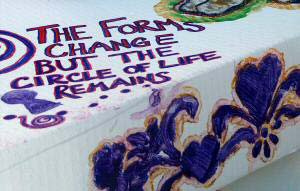What Most People Don't Know or Can't Fathom About Cremation
By Amy Cunningham, Fitting Tribute Funeral Services, Brooklyn, NY
Cremation does not replace the funeral. You can still have a funeral with the body present before the cremation, or a memorial service with an urn there afterwards.
If a cremation is planned–and a wake, formal funeral or identification of the body is still anticipated– you needn’t be saddled with the costs of a casket. Ask your funeral home about a ceremonial rental casket with cardboard cremation liner.
The lowest cremation price in the phone book or from a Google search is too low. Trust me. Funeral homes charging bottom dollar may be cutting corners to increase their total sales volume (or annual calls).
If time allows and the family is interested, the cremation box can be creatively decorated. Ask your funeral director to charge you extra to bring the cardboard cremation box to your house so that you and the grandkids (for example) can write, paint and draw on grandma’s casket. Sounds potentially strange and disastrous, I know, but like brides on their wedding day, these home decorated sacred vessels are surprisingly gorgeous and engage the family in an activity that is wildly uplifting.
For an additional sum, a short service with closed casket or cremation box can generally be held at crematories that have a chapel attached to them. The box or casket’s entry into the retort (or cremation chamber) can also be personally witnessed or scheduled for a specific time. Witnessing gives some families peace of mind, and a feeling that the deceased person was accompanied "the whole way." If you’re not up for this, you could ask a friend to witness the casket's entry into the retort for you.
An unceremonious or “direct” cremation can mean (depending upon the funeral firm) that the deceased will be cremated in a plastic body bag or hospital gown. Most grieving families never think about this in advance and if they did, they’d probably realize that, of course, they’d like the deceased properly dressed.
You can have your deceased relatives bathed and dressed for a quick viewing or just to know they went to the crematory looking as good as they could look. For this, your funeral bill may only go up only $300-$500.
Ash is mostly pulverized bones, inert minerals left in the retort after burning which are then processed by a noisy mill into a grainy powder.
Cremated remains weigh about four pounds and are returned to the family in a boxy, plastic, temporary container. Please don't let this box sit too long in a hall closet. This is bad Feng Shui, among other things. Buy an urn. Do something with the remains. Move the old energy of loss out as soon as you are ready.
Cremated remains—by themselves when scattered—are not especially good for plants. There’s a product called Let Your Love Grow that, when mixed in, makes the ashes better for growing things.
Cremation takes up less land and might save some money, but here's the downside with some crematories: it takes a lot of fossil fuel to heat that retort (or oven) to 1800 degrees F and keep it heated for two to three hours. Ask your crematory about how many cremations are performed in the average day since busy crematories are more fuel efficient (as the retort is not constantly being cooled and reheated). Also ask how up-to-date the equipment is (more modern the better). Then perhaps, if you are not satisfied with the answers you're getting and your family is open to changing plans quite dramatically, consider the new love of my life (sorry Steve)–green burial. Pine box. Or simple shroud. Drive out of the city and convene in a green cemetery. Let your loved one descend into the soil naturally and graciously. This is the way our teachers, Jews and Muslims, have done it all along. And it's something I'll post more about later.

